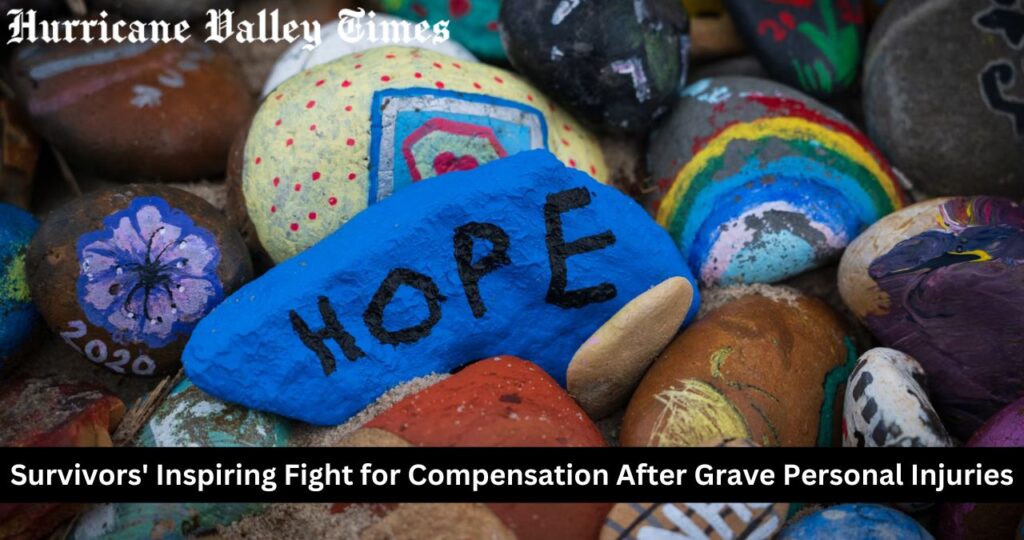In the wake of life-altering accidents and injuries, survivors often face a daunting journey toward recovery and justice. The path to personal injury compensation is rarely smooth. They are fraught with legal complexities, corporate resistance, and emotional turmoil.
However, these battles fought in courtrooms and boardrooms ripple far beyond individual cases. They have the power to shape safety standards and legal precedents that affect us all. Every year, millions of Americans suffer injuries due to others’ negligence.
This exploration delves into the real-life accounts of survivors who’ve taken on formidable opponents—from multinational corporations to powerful institutions—in their quest for rightful compensation. Their stories reveal the human tenacity that drives change and accountability in our society.
A Veteran’s Battle Against PFAS-Induced Terminal Illness
A young musician took a life-altering decision to leave his love for music to join the Air Force as a firefighter in 1975. Little did Dan Casson know that this selfless act to serve the nation would haunt him for life.
As stated on Fox 17, Dan worked as a crash rescue specialist. He braved infernos to save lives while his colleagues deployed aqueous film-forming foam (AFFF), the military’s preferred fire suppressant.
“They deceived us,” Casson recounts. “When we inquired about the foam’s contents, they dismissed it as soap suds. They misled an entire cadre of firefighters.”
Contrary to this benign characterization, AFFF harbors per- and polyfluoroalkyl substances (PFAS). These are known carcinogens with environmental persistence. Numerous veterans have reported severe health complications linked to AFFF exposure at military installations. Despite its cessation decades ago, the repercussions continue to reverberate.
Casson and his fellow first responders assert that military officials were aware of AFFF’s health risks for an extended period. However, they failed to disclose this critical information.
Seeking justice and compensation proved arduous for Casson. Despite amassing comprehensive medical documentation, his efforts to establish a causal link between PFAS exposure and his cancer diagnosis were repeatedly rebuffed.
It wasn’t until 2019 that the Department of Veterans Affairs acknowledged the service-connected nature of his cancer, granting him full disability compensation.
While financial restitution cannot mitigate the anguish of a foreshortened life, it offers a glimmer of hope. The compensation provides access to previously unattainable treatment options. For Casson, this victory transcends personal vindication. It serves as a beacon for fellow veterans and their families in their ongoing struggle for recognition and justice.
A Survivors Battle in Pursuit of Straight Hair
According to NBC News, Bree-Shawna Watts’ life trajectory was irrevocably altered at the age of 32. She found herself engulfed in a maelstrom of health crises. Her ordeal encompassed an aggressive cancer diagnosis, a comprehensive hysterectomy, and premature menopause.
All stemmed from a seemingly innocuous beauty regimen she had faithfully followed since childhood.
The culprit? Chemical hair relaxers are a product she has been applying to her natural curls bimonthly since the tender age of five. TorHoerman Law reports that using hair relaxers frequently has been linked to increased chances of ovarian, breast, and uterine cancer in women. Most companies, like L’Oreal, Dark & Lovely, and Just For Me, have harmful toxins like formaldehyde in their straightening products.
Watts’ diagnosis rapidly escalated to uterine sarcoma, necessitating the surgical removal of her reproductive organs. Her subsequent treatment regimen was grueling: 25 rounds of radiation coupled with hormone therapy to mitigate the intense discomfort.
The realization that a commonplace cosmetic product could wreak such havoc propelled Watts into legal action. She initiated litigation against L’Oreal and other manufacturers. Her claim challenges their marketing practices targeting young African American girls. These norms pressurize them to conform to societal beauty standards at the cost of their health.
Moreover, most hair relaxer lawsuits allege that the cosmetics industry giants hid the life-threatening side effects of their products for increased profits.
Such instances of legal action transcend personal retribution. They aim to usher in an era of transparency where cosmetic companies can no longer obscure the severe risks associated with their products.
Camp Lejeune’s Toxic Legacy
The Camp Lejeune water contamination crisis is a stark reminder of the long-lasting impact of environmental negligence on military personnel and their families.
From 1953 to 1987, approximately one million service members and civilians at Camp Lejeune were unknowingly exposed to water contaminated with industrial solvents. In some areas, as reported by the Federal News Network, the toxicity levels were a staggering 3,400 times the safety standards.
As narrated to CBS News, Marine Corps Sergeant Dave Metzler’s story epitomizes the struggle many veterans face. After serving 34 months at Camp Lejeune in the late 1950s, Sgt. Metzler developed severe balance issues and hearing loss. The psychological toll of his deteriorating health was immense, even driving him to contemplate suicide.
Sgt. Metzler filed disability claims in 2014 and 2015, citing chemical exposure at Camp Lejeune as the cause of his conditions. However, he encountered significant resistance. The VA rejected Camp Lejeune’s claims using opaque “subject-matter expert” decisions, highlighting a systemic issue in addressing these cases.
Undeterred, Sgt. Metzler’s daughter, Patty Metzler, a nurse practitioner, took up the fight. Her meticulous research and unwavering determination led to a 2017 appeal.
In 2018, a VA judge overturned previous denials, granting Sgt. Metzler 100% disability. Tragically, this victory came 14 months after Sgt. Metzler’s passing.
The Metzler family’s journey is a poignant illustration of the protracted battles many veterans face in their quest for recognition and compensation.
FAQs
1. What is AFFF, and why is it dangerous?
AFFF (Aqueous Film-Forming Foam) is a fire suppressant used by the military. It contains PFAS, a known carcinogen with environmental persistence. Many veterans exposed to AFFF have reported severe health complications, leading to legal battles for compensation and recognition of service-related illnesses.
2. How are hair relaxers linked to health risks?
Chemical hair relaxers, especially those targeting African American women, have been linked to increased risks of ovarian, breast, and uterine cancers. Products from companies like L’Oreal and Dark & Lovely often contain harmful toxins such as formaldehyde, leading to lawsuits against manufacturers.
3. What was the Camp Lejeune water contamination crisis?
Between 1953 and 1987, approximately one million individuals at Camp Lejeune were exposed to water that had been contaminated with industrial solvents. In certain areas, the toxicity levels exceeded safety standards by a staggering 3,400 times. This led to severe health issues, like cancer, for many veterans and their families and prolonged battles for disability compensation.
The stories of these survivors illuminate the resilience of the human spirit in the face of corporate negligence and institutional indifference. Their battles for justice extend beyond personal vindication, catalyzing systemic changes that protect future generations.
Society is grappling with the long-term consequences of technological advancements and environmental oversight. Today, these narratives serve as powerful reminders of the importance of vigilance, advocacy, and compassion.
Ultimately, their struggles underscore the critical role of an informed and engaged citizenry in shaping a more just and accountable world.


